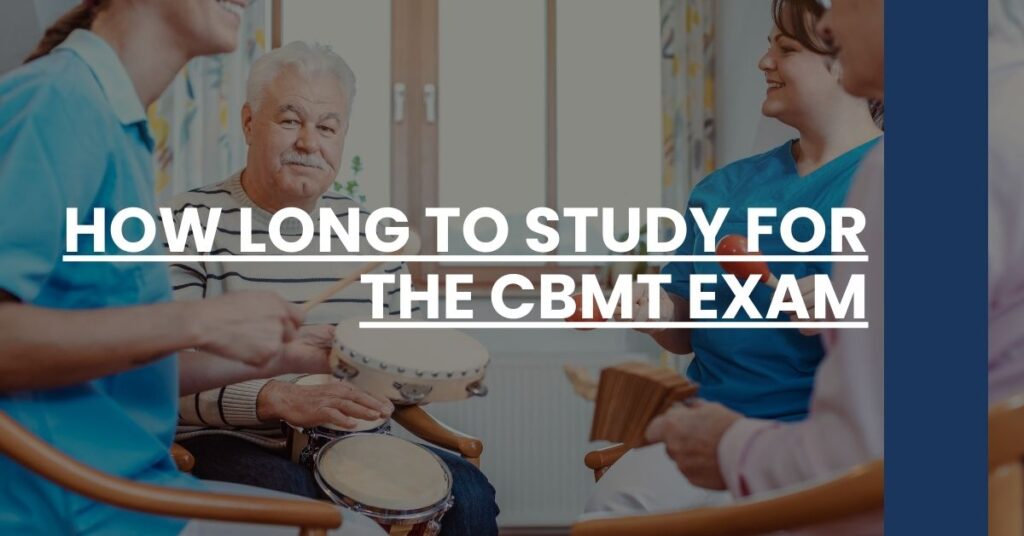How long to study for the CBMT exam is critical for candidates to know. Preparing efficiently can make all the difference.
- Optimal Study Duration: Determining the right amount of time for effective preparation.
- Customized Study Plans: Tailoring your schedule to fit your unique learning needs.
- Maximizing Preparation Time: Strategies to enhance your study sessions and retain more information.
Ensuring you know how long to study for the CBMT exam sets the stage for success.
- Understanding the CBMT Exam
- Factors Influencing Study Time
- Recommended Study Duration: An Expert Consensus
- Crafting Your Study Plan
- Study Materials and Resources
- Time Management Techniques for Exam Preparation
- Balancing Study with Work or Internship Commitments
- When to Start Studying: Timing Your Preparation
- Signs You’re Ready to Take the CBMT Exam
- Adjusting Your Study Plan Based on Practice Exams
- Frequently Asked Questions
- Conclusion
Understanding the CBMT Exam
If you’re preparing for the CBMT (Certification Board for Music Therapists) exam, it’s crucial to understand what you’re facing. This exam is the gateway for music therapists to become board-certified, verifying your expertise and commitment to the profession. The CBMT exam tests your knowledge and skills across three primary content areas: Clinical Foundations, Clinical Practice, and Professional Practice.
The test comprises 150 multiple-choice questions that evaluate your understanding of music therapy principles, client assessment, therapy techniques, and ethical practice standards. You’ll need to have a firm grasp on topics like:
- Music Foundations: Understanding of music theory, history, and the application of musical elements in therapy.
- Clinical Applications: Abilities in client assessment, treatment planning, and implementation of therapy interventions.
- Professional Responsibilities: Knowledge of ethical, legal, and business aspects of music therapy practice.
Each section of the exam correlates to specific Board Certification Domains and is designed to assess how you would handle various situations as a professional music therapist.
Why Understand Exam Structure?
Knowing the structure helps you determine how long to study for the CBMT exam by providing a roadmap of the topics you’ll need to cover. You’re not just learning to pass a test; you’re fortifying your professional competence in music therapy.
Factors Influencing Study Time
No two candidates are the same, and some may require more or less time to prepare for the CBMT exam based on various factors. Consider your:
- Background Knowledge: Do you have a robust foundation in the exam’s subjects, or are there areas where you’re less confident?
- Learning Style: Are you a visual learner, or do you retain information better through reading or practice?
- Work Experience: Have you had practical experience that has solidified your understanding of the material?
- Study Habits: Are you adept at focusing and retaining information, or do you find you need more time to fully grasp new concepts?
Reflect on where you stand with each of these elements as you decide on the length of your study timeline.
Recommended Study Duration: An Expert Consensus
Based on feedback from educators and seasoned music therapists, a study duration of two to six months is typically recommended. This time frame allows most test-takers to thoroughly review all content areas without the need to rush or the risk of information fading from memory.
Breakdown of Recommended Study Time:
- 2-3 Months: Ideal for recent graduates or those with considerable exposure to the exam’s content areas in their professional work.
- 4-6 Months: Beneficial for individuals who have been out of school for some time or require a more comprehensive review.
Adjusting this time frame according to your personal needs and strengths will ensure you’re neither underprepared nor overwhelmed.
Crafting Your Study Plan
A well-structured study plan is your blueprint to success. It should be detailed, flexible, and align with your learning style. Here’s how you can craft a study plan that equips you for the CBMT exam:
- Assess Your Starting Point: Take a Self-Assessment Exam to pinpoint your strengths and weaknesses.
- Allocate Time Wisely: Divide your study time proportionally, dedicating more to areas that need improvement.
- Incorporate Different Study Methods: Combine readings, practice tests, and scenario-based questions to cater to different learning styles.
Regular Review Sessions:
- Weekly Check-ins: Regularly assess your progress and adjust your study plan to ensure you’re advancing steadily toward your goal.
- Spotlight on Trouble Areas: Dedicate extra time to topics that challenge you—understanding, not memorization, is key.
A personalized study plan, when executed diligently, can significantly reduce the duration needed to study for the CBMT exam, making your preparation both efficient and effective.
Study Materials and Resources
Selecting the right materials is vital in preparing adequately for the CBMT exam. Here’s what you should consider incorporating into your study arsenal:
- CBMT Candidate Handbook: Offers comprehensive information on the exam format and procedures.
- Textbooks: Essential resources like “Music in Therapy: An Evidence-Based Approach” and “Clinical Applications of Music Therapy in Psychiatry.”
- Practice Tests: Mock exams that mimic the actual CBMT test environment.
Visit blogs like Wendy Hills Music to explore free study guides and notes from those who’ve successfully passed the exam.
Types of Study Materials:
- Online Courses: Offer structured lessons and can be especially helpful if you need more guidance.
- Flashcards: Handy for reviewing terms and concepts on the go.
Ensure your study materials are current and align with the latest CBMT domains to make your study period as effective as possible.
Time Management Techniques for Exam Preparation
Time management is pivotal in your pursuit of being well-prepared for the CBMT exam. Here’s how you can manage your study time astutely:
- Set Specific Goals: Break down your study sessions with clear, achievable objectives.
- Study Blocks: Dedicate time blocks solely to studying, and use a timer to maintain focus.
- Regular Breaks: Incorporate short breaks to avoid burnout and keep your mind fresh.
Further strategies such as these can be found on pages like Sequel Melody’s Services, which emphasize optimizing study habits.
Prioritization is Key:
- Essential Topics First: Tackle the most significant areas of the exam early in your study schedule.
- Balanced Approach: Ensure that no single subject dominates your study time at the expense of others.
Applying these time management techniques will help you maintain a steady pace and reduce the duration needed to study for the CBMT exam.
Balancing Study with Work or Internship Commitments
Combining work or internship commitments with preparation for the CBMT exam can be daunting. However, with the right approach, it is entirely feasible. The key to managing this balance lies in organizing your time and activities effectively so that one does not adversely affect the other.
Creating a Work-Study Schedule
- Prioritize Essential Tasks: Identify the non-negotiables in both your work and study schedules. Prioritize them to ensure they get sufficient attention.
- Integrate Study Blocks: Consider your work or internship hours and find blocks of time that can be dedicated solely to studying.
- Communicate with Employers: Be transparent with your employer or supervisor about your exam aims. They might offer more flexibility in your work schedule.
Efficiently managing your time often means identifying overlapping skills and learnings that can be transferred between your workplace and your studies. For example, on-the-job experiences can reinforce theoretical concepts for the CBMT exam.
Time-Saving Strategies
- Leverage Downtime: Use breaks or commutes to review flashcards or listen to educational content related to your exam.
- Merge Commitments: If possible, align work projects with study topics to deepen your professional practice while studying.
- Seek Support: Reach out to colleagues or fellow interns who may also be studying for exams and consider forming a study group.
Sticking to a strictly outlined schedule will help in determining how long to study for the CBMT exam while juggling work or internship duties.
When to Start Studying: Timing Your Preparation
The ideal start time for preparing for the CBMT exam is closely tied to the test dates and registration deadlines. You should allow yourself sufficient time to review all content areas thoroughly and to do practice exams.
Important Dates to Consider
- Registration Deadlines: Mark the registration deadlines on your calendar. Plan to start studying well in advance.
- Exam Dates: Work backwards from the exam date to ensure adequate preparation time.
Ideally, initiating your study plan 6 months before the exam allows for a leisurely pace with less stress. If you’re starting later, a more intense, focused approach might be necessary.
Integrating Practice Exams
- Initial Assessment: Early in your study plan, take a practice exam to establish a baseline.
- Iterative Testing: Schedule practice exams periodically to measure your progress.
Remember, practice exams are critical tools in assessing how long to study for the CBMT exam, giving you an indication of when you might be ready.
Signs You’re Ready to Take the CBMT Exam
Recognizing when you’re sufficiently prepared for the CBMT exam is crucial. There are specific signs which suggest you’re ready to schedule your test.
Confidence Indicators
- Consistent Scores: Achieving consistently high scores on your practice exams.
- Familiarity with Content: Feeling comfortable with the content areas and types of questions you’ll face.
- Minimal Anxiety: Feeling relatively relaxed about the idea of taking the exam.
When these indicators are in place, you can be confident that you’ve spent long enough studying for the CBMT exam and are ready to demonstrate your knowledge and skills.
Adjusting Your Study Plan Based on Practice Exams
One significant advantage of practice exams is their ability to highlight your weak areas. These insights should directly influence and refine your study approach.
Actions to Take
- Focus on Weaknesses: Dedicate additional study time to the areas where you score the lowest.
- Alter Study Methods: If certain study methods aren’t yielding results, don’t be afraid to try new techniques.
- Review Wrong Answers: Spend time understanding why a particular answer was incorrect to prevent similar mistakes.
By adjusting your study plan based on practice exams, you’re ensuring that your preparation remains dynamic and targeted, optimizing the time you need to study for the CBMT exam.
Frequently Asked Questions
When you’re planning your exam preparation timeline, numerous questions may arise. Let’s address some common ones related to how long to study for the CBMT exam.
Quick Queries Answered
- Is Cramming Effective? While cramming might work for a small quiz or test, the CBMT exam covers a breadth of knowledge that requires deep understanding, not last-minute memorization.
- How to Stay Motivated? Set small, achievable goals, celebrate your achievements, and remember why you chose the field of music therapy.
Ensuring your queries are answered can help you feel more secure in how much time you’ll need to study for the CBMT exam.
Conclusion
Preparing for the CBMT exam doesn’t have a one-size-fits-all timeline. By acknowledging your unique circumstances, background, and strengths, you can create a study schedule that is personalized and effective. The goal is not just to pass the exam but to do so with the assurance that comes from thorough and strategic preparation. Your journey to becoming a board-certified music therapist is as much about the process as it is the result. Take the time you need, plan wisely, and you’ll set yourself up for success on the CBMT exam and your career beyond.
Discover how long to study for the CBMT exam and optimize your preparation with our comprehensive timetable and tips.

